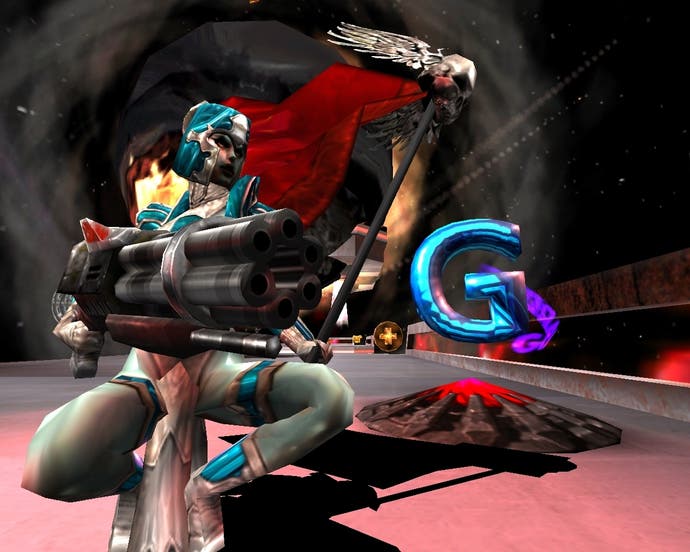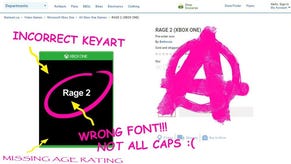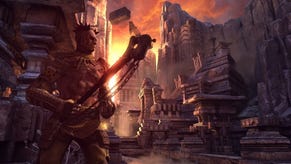Id Software's John Carmack
Why brainless shooters win, why Apple doesn't get it and everything in-between.
You're reading about games on the internet, so along with Shigeru Miyamoto and Will Wright, we can take for granted that you know about John Carmack. Once a year at QuakeCon, Carmack addresses the fans of games made by the company he founded, id Software, and for which he's still technical director. That job means he can pick his programming assignments, and spend time driving the company's research and development, occasionally being called upon to fix bugs that entire companies have been unable to squash. His legend is such that his support is coveted by console platform holders and computer giants like Microsoft and Apple.
Now in its 13th year, QuakeCon also gives us the opportunity to talk one on one with Carmack about what he's up to, and what he makes of current trends in hardware and software. Id's currently hard at work on first-person action/driving hybrid Rage, and free-to-play, web-based Quake 3 Arena revamp Quake Live; tooling up to build the next generation Doom; and diversifying into fields like mobile phone games and development for Apple's iPhone. So there's a lot to cover as we take our seat in a vast meeting room in the depths of the Hilton Anatole in Dallas opposite the man who, as cool as we so obviously are, still makes us wish we'd been a proper nerd.
It's just a plain superior thing! Kinaesthetically it's just the right interface for that, but it comes down to what environment you play the games at. You're not going to have your living room with a little desk table in front of you to play usually, so different controls for different environments on there. That's why I'm happy that we can have a game now that we're looking at, we're pushing, that is going to be this precision, high-speed, fast-paced action stuff on there.
I hope it can be [that] on the PC space, because gamers are migrating off of the PC. But it's still, for a lot of these things, a perfectly wonderful platform, better in many ways than the console because if you're going to do things - wrapping it in a web-page, having all these statistics and tracking stuff and events - the PC is just far better at that. The PC is a better internet device than the consoles are - the mouse and keyboard are better.

Rage it won't be anything like this for sure. Rage is going to have co-op play - it's basically a separate mode to the game using the same assets on it - it's intended to be a jump-in-and-have-fun, not so much a ranking-and-leaderboards type of game there, but a way to have fun with your friends. There'll probably be a lot of split-screen play but also a lot of internet play on that.
With Doom we haven't made final decisions yet, but I would expect it to wind up being a larger focus than it was with Quake 4. It's still not going to be the central focus. It's still going to be a single-player experience through that that's going to be a finely-honed and crafted experience for people to get pulled through - but multiplayer will be there as a significant asset, and I would hope that we can leverage some of the Quake Live infrastructure, certainly a lot of the lessons that we learned, because we're going to be really in the thick of the evolutionary stew as we go through this. We'll learn a lot from all of it.
No, it doesn't bother me at all personally. I don't care what the equivalent of a literary critic thinks about this stuff on there. The fact that people are still playing Quake Arena, the original game, nine years after, means that we did something really right there, and while there were games that came out contemporously with Quake 3 that sold a bunch more copies - we got much more play-hours out of our game all told over that.

It is true that Rage and the next Doom are designed much more as a game that has a story arc that people can go through that we make sure that you're going to have fun through the whole thing. It's going to be balanced so that we never want to frustrate the player, you never want to make them do something where they're upset, pissed off at the game, whatever, which fundamentally means that you can't challenge them too much because there's a big trade-off there between coddling the player in a bubble of entertainment that moves through all this wonderful media, versus something where...Only a subset of the people who buy games want a challenge, and we know that games like Quake Arena, which are competitive, fundamentally there's a lot more losers than there are winners, which is why team games were always more popular than kind of free-for-all deathmatch games, because half the people wind up being winners, and the thing about co-op games is that everybody playing can be a winner because you work together to beat the environment on there.
So I don't think that the Quake Arena basic design is the broadest appeal of games, but I do think there's still many millions of people that will appreciate that type of gameplay, and that we can get them on. There's no barriers to entry, [Quake Live's] free, they don't have to guess in coughing up 50/60 bucks for a high-end game on there, and while there may well be 50 million people that might love the cocooned-in-a-bubble-of-entertainment type gameplay going through some big-budget blockbuster, I think there's 5 million or more people that can really appreciate this type of game.









